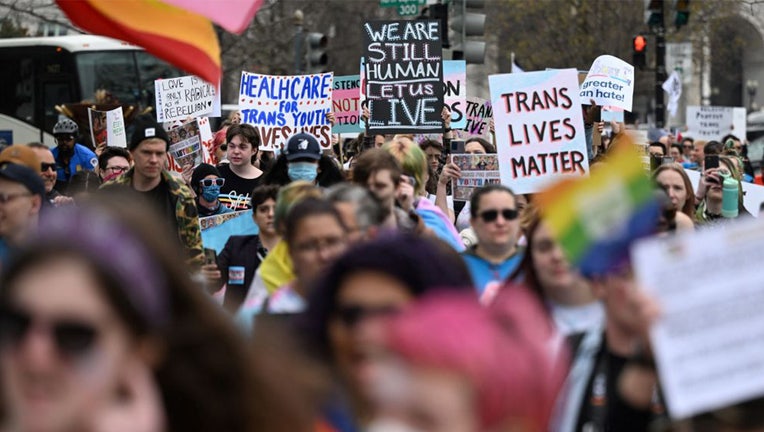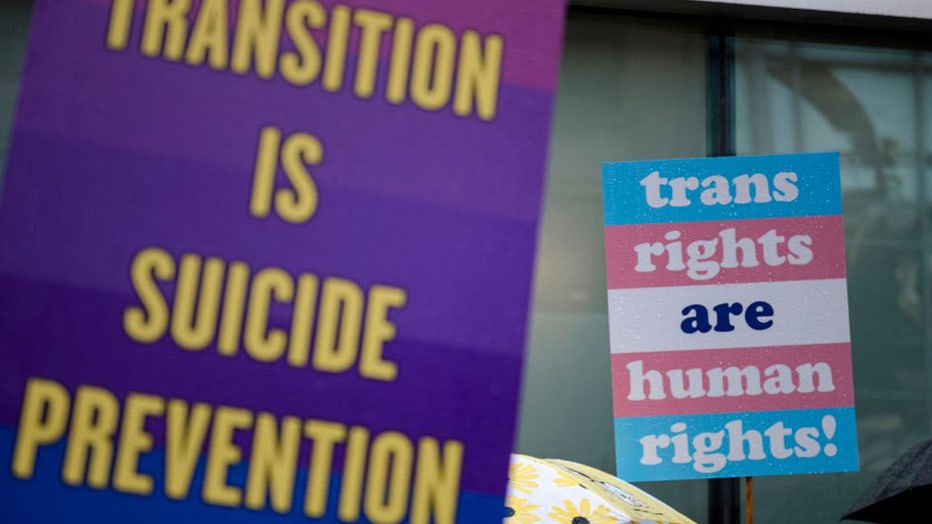US rule would bar full ban on transgender student athletes but will allow exceptions

FILE - Supporters of LGBTQA+ rights participate in the March for Queer & Trans Autonomy on Capitol Hill in Washington, DC on March 31, 2023. (ANDREW CABALLERO-REYNOLDS/AFP via Getty Images)
WASHINGTON - Schools and colleges across the U.S. would be forbidden from enacting outright bans on transgender athletes under a proposal released Thursday from the Biden administration, but teams could create some limits in certain cases — for example, to ensure fairness.
The proposed rule sends a political counterpunch toward a wave of Republican-led states that have sought to ban trans athletes from competing in school sports that align with their gender identities. If finalized, the proposal would become enshrined as a provision of Title IX, the landmark gender equity legislation enacted in 1972.
It must undergo a lengthy approval process, however, and it’s almost certain to face challenges from opponents.
The proposal comes on the same day that the Supreme Court said a 12-year-old transgender girl in West Virginia can continue competing on her middle school track and cross-country teams while legal battles over the state’s transgender law continue. The law bans transgender athletes from female teams.
All told, at least 16 states now have bans in effect covering at least high school interscholastic sports. Some also extend to intramural, club or college sports. Enforcement of bans in at least three states has been put on hold by courts, and one more has adopted a ban that doesn’t take effect until July.
RELATED: Kansas passes transgender bathroom bill; Arkansas approves own version of legislation
Under the Education Department's proposed rule, no school or college that receives federal funding would be allowed to impose a "one-size-fits-all" policy that categorically bans trans students from playing on sports teams consistent with their gender identity. Such policies would be considered a violation of Title IX.
Still, it leaves room for schools to develop team eligibility rules that could ultimately result in restrictions around trans athletes’ participation.
That would be allowed only if it serves "important educational objectives," such as fairness in competition and reduction of injury risks.
Any limits would have to consider the sport, the level of competition and the age of students. Elementary school students would generally be allowed to participate on any teams consistent with their gender identity, for example. More competitive teams at high schools and colleges could add limits, but those would be discouraged in teams that don’t have tryouts or cuts.
"Every student should be able to have the full experience of attending school in America, including participating in athletics, free from discrimination," Miguel Cardona, Biden’s education secretary, said in a statement.
The Biden administration used "fairness of competition" as criteria, which has been part of the debate both in the U.S. and globally. But officials offered no specifics on how this could be done.
Of the tens of millions of high school students in the U.S., about 300,000 youth between the ages of 13 to 17 identify as transgender, according to a 2022 study from the Williams Institute, a think tank at UCLA focused on LGBTQ+ issues. The number of athletes within that group is much smaller; a 2017 survey by Human Rights Campaign suggested fewer than 15% of all transgender youth play sports.

FILE - Signs are seen as LGBTQ activists protest on March 17, 2023, in front of the US Consulate in Montreal, Canada, calling for transgender and non-binary people be admitted into Canada. (ANDREJ IVANOV/AFP via Getty Images)
Asked about the state bans now in place, a senior Education Department official briefing reporters on condition of anonymity said Title IX is the law of the land and they would work to ensure it’s being followed in all the states.
In the West Virginia case, the Supreme Court refused to undo an appeals court order that made it possible for the girl, Becky Pepper-Jackson, to continue playing on her school’s teams. The state's law on transgender athletes defines male and female by looking to the student’s "reproductive biology and genetics at birth." It applies to middle and high schools, as well as colleges.
A new law in Kansas banning transgender athletes from girls’ and women’s sports from kindergarten through college takes effect July 1. Bill Faflick, executive director of Kansas State High School Activities Association, said his organization would need to review the administration’s proposal before comment.
Critics argue transgender athletes have an advantage over cisgender women in competition. Last year, Lia Thomas became the first transgender woman to win an NCAA swimming title. College sports’ governing body, however, adopted a sport-by-sport approach to transgender athletes in January 2022, which was to bring the organization in line with the U.S. and International Olympic committees, though recently the NCAA’s board decided it won’t be fully implemented until 2023-24.
The NCAA did not immediately respond to an email seeking comment.
At the same time, international sports-governing bodies are instituting policies that ban all trans athletes from competing in track and field and effectively ban trans women from swimming events.
Fatima Goss Graves, president and CEO of the National Women’s Law Center, said in a statement that they were grateful for the administration's actions and would work to ensure that "a final rule builds to further fight back against discrimination and misinformation, making crystal clear that trans, nonbinary, and intersex students are entitled to support, respect, and equal rights and opportunity."
But an attorney for cisgender runners decried the proposal as "as slap in the face to female athletes who deserve equal opportunity to compete in their sports."
"The Biden administration’s rewriting Title IX degrades women and tells them that their athletic goals and placements do not matter," said Christiana Kiefer, senior counsel at Alliance Defending Freedom. She represented Connecticut runners who sued over the participation of two transgender girls in track and field events.
The Biden administration has made it a priority to bolster the rights of trans students. Last year it proposed a separate federal rule that for the first time would extend Title IX rights to LGBTQ students, broadly protecting them from discrimination in education.
That rule — which drew more than 240,000 comments from the public and sharp opposition from conservatives — is expected to be finalized as soon as next month.
The new proposal doesn’t offer examples of acceptable limits that can be placed on school sports, but it clarifies that restrictions can’t be directed at trans students only. Schools will be left to navigate that tricky legal terrain, with the knowledge that any violation could bring a federal civil rights investigation or lawsuits.
Schools that choose to impose limits must "minimize harms" to students who lose out on athletics opportunities, the proposal says. If a school can achieve objectives like fairness in ways that cause less harm, then the school could be deemed to be violating Title IX.
"Preventing students from participating on a sports team consistent with their gender identity can stigmatize and isolate them," according to background information provided by the administration. "This is different from the experience of a student who is not selected for a team based on their skills."
Schools that violate Title IX can face penalties up to a compete loss of federal funding, although no school has ever been dealt that punishment.
___
AP Sports Writers Eric Olson in Omaha, Nebraska, and John Zenor in Birmingham, Alabama, and AP writer Pat Eaton-Robb in Hartford, Connecticut, contributed to this report.
___
The Associated Press education team receives support from the Carnegie Corporation of New York. The AP is solely responsible for all content.

